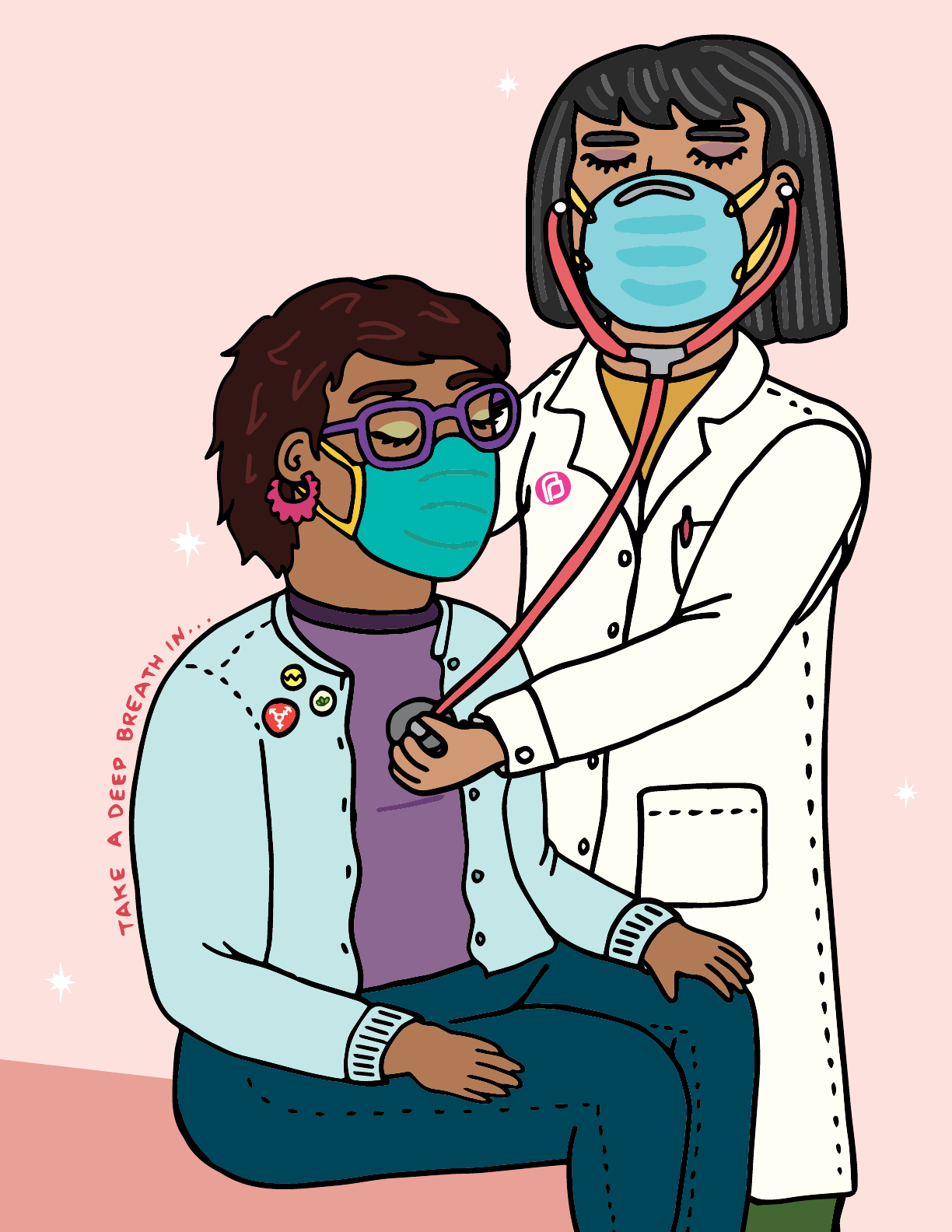
2020 Impact Report
Planned Parenthood
South Texas
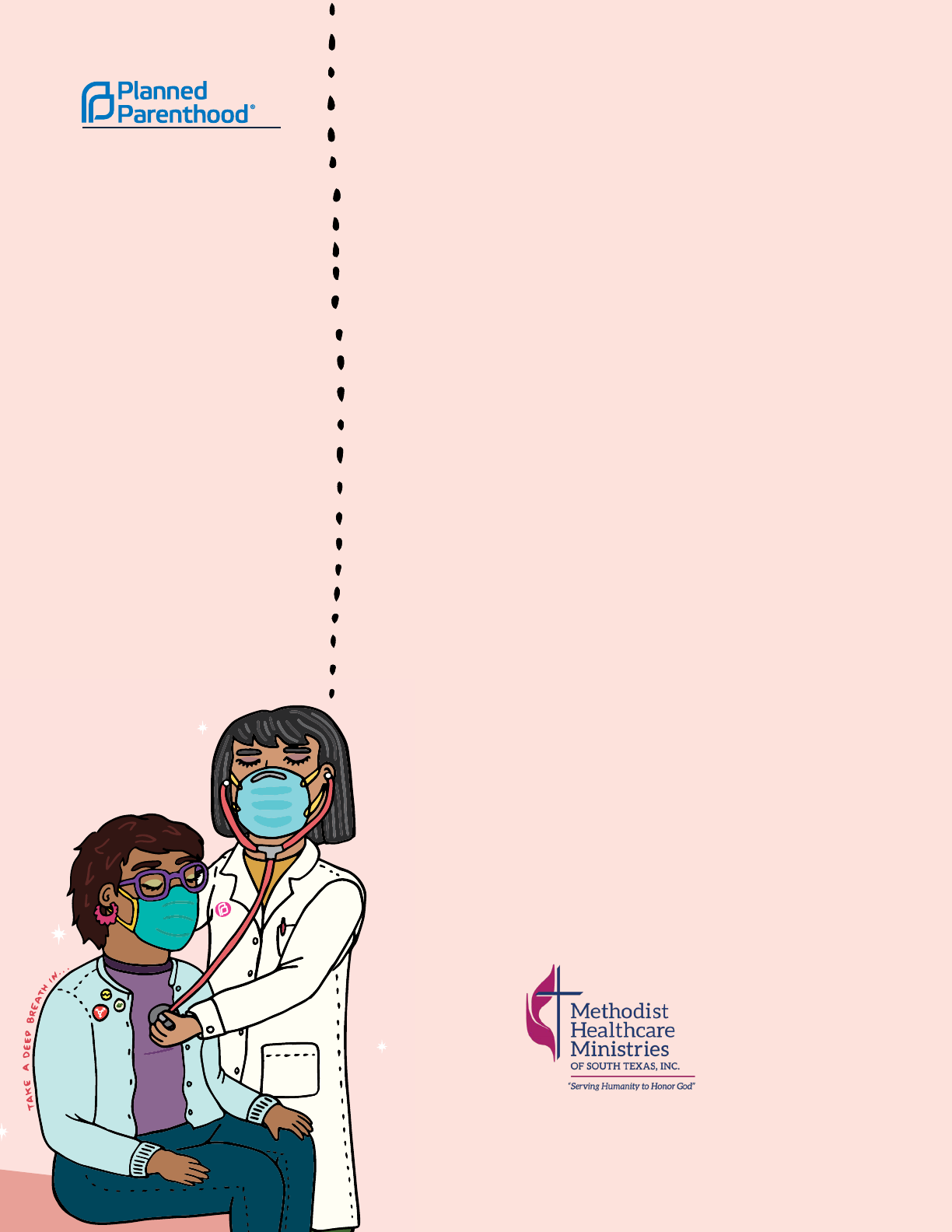
MISSION STATEMENT:
We provide and protect the health care and information people need to
plan their families and their futures.
2021 BOARD OF DIRECTORS
Elise Ring Boyan, Chair
Merritt Clements, Vice Chair
Catherine Payer, Treasurer
Brian Steward, Secretary
Kathy Armstrong, Immediate Past Chair
Lisa Alcantar
Brooke Benson
Jane Bockus
Dr. Laurie Greenberg, MD
Stephanie Guerra
Alison Kennamer
Mina López
Fernando Martinez, PhD
Maria Mathis
Liz McFarland
Mayra Mendoza
Patricia Morales
MaryEllen Veliz
Daniel Walker
STAFF LEADERSHIP
Jeffrey Hons, President & CEO
Polin C. Barraza, RN, Senior Vice
President & COO
Angela Koester, Vice President
for Community Engagement
Valerie Mascorro, Associate Vice
President for Operations & Growth
Planned Parenthood South
Texa
s
TABLE OF CONTENTS
Our services ................................................................................1
Health care in 2020 ....................................................................2
Birth control ................................................................................3
Sexually transmitted infections .................................................4
Stop Cervical Cancer .................................................................. 5
Telehealth ....................................................................................6
Who we served in 2020 .............................................................7
In the community ........................................................................8
Health care at Rio Grande Valley health centers .....................9
Health care at San Antonio health centers ............................ 10
On the cover: Illustration by Isabel Ann Castro
www.ppsouthtexas.org | 800-230-7526
THANK YOU TO OUR GENEROUS FUNDERS
The work of Planned Parenthood South Texas is made possible by support
from you and from institutional partners, including
:
2020
Impact
Report

2020 IMPACT REPORT: OUR SERVICES | 1
Our services
BIRTH CONTROL
Includes condoms, several types of
birth control pills, long-acting reversible
contraceptives (IUDs and implants), the birth
control shot, the vaginal ring, the hormonal
patch, and emergency contraception.
GYNECOLOGY
Pelvic exams; tests and treatment for vaginal
infections and urinary tract infections; clinical
evaluation of menopause and hormonal
replacement therapy when indicated; clinical
breast exams that can detect abnormalities,
including the early signs of breast cancer;
mammogram referrals.
STI TESTING AND TREATMENT
Testing and treatment for sexually
transmitted infections, including the latest
rapid-based testing for some of the more
frequently requested tests that can provide
results at the time of visit.
STOP CERVICAL CANCER
Vaccines to prevent human
papillomavirus (HPV); HPV tests and
Pap tests; diagnosis of cervical cells
that could lead to cancer; removal of
abnormal cells before they can lead to
cancer; and, for people with cervical
cancer, referrals and patient navigation
for immediate oncological care.
ABORTION CARE
The abortion pill and in-clinic procedures
provided at two locations in San Antonio. In
2020, 77% of the abortion care we provided was
medication abortion, and 95% of all abortion
care was in the rst trimester.
MALE SEXUAL HEALTH EXAMS
Examination of the genitals and perianal
region, including hydrocele, varicocele,
and signs of sexually transmitted infections;
clinical examination of the testicles to
screen for abnormalities that could
become cancer and patient instruction on
performing self-examination.
FERTILITY SERVICES
Diagnosis of common causes of
infertility and provision of initial
treatment options.
PRE-EXPOSURE PROPHYLAXIS (PrEP)
Prescriptions for daily medication to lower
the risk of contracting HIV for people at
higher risk of contracting the virus.
PREGNANCY TESTING
Urine, blood-based testing, and human
chorionic gonadotropin (HCG) based testing
(a critical test that helps diagnose an ectopic
pregnancy).
REFERRAL FOR PRENATAL CARE
AND ADOPTION
Planned Parenthood respects all decisions
by patients regarding their pregnancies. We
provide patients who decide to continue their
pregnancy with information and referrals for
prenatal care and adoption services.
GENDER-AFFIRMING
HORMONE THERAPY
Estrogen or testosterone for patients who
are transgender, non-binary or gender-
nonconforming. This service is available for
patients 18 years old and older.
NEW! PRIMARY CARE
Because we know that for many of our
patients we are their only regular health care
provider, we began rolling out primary care
services at our health centers in December
2020. This includes screenings and treatment
for conditions such as diabetes, asthma,
hypertension, anemia, depression, allergies
and acne, as well as treatment for sore throat,
eye infections and more.
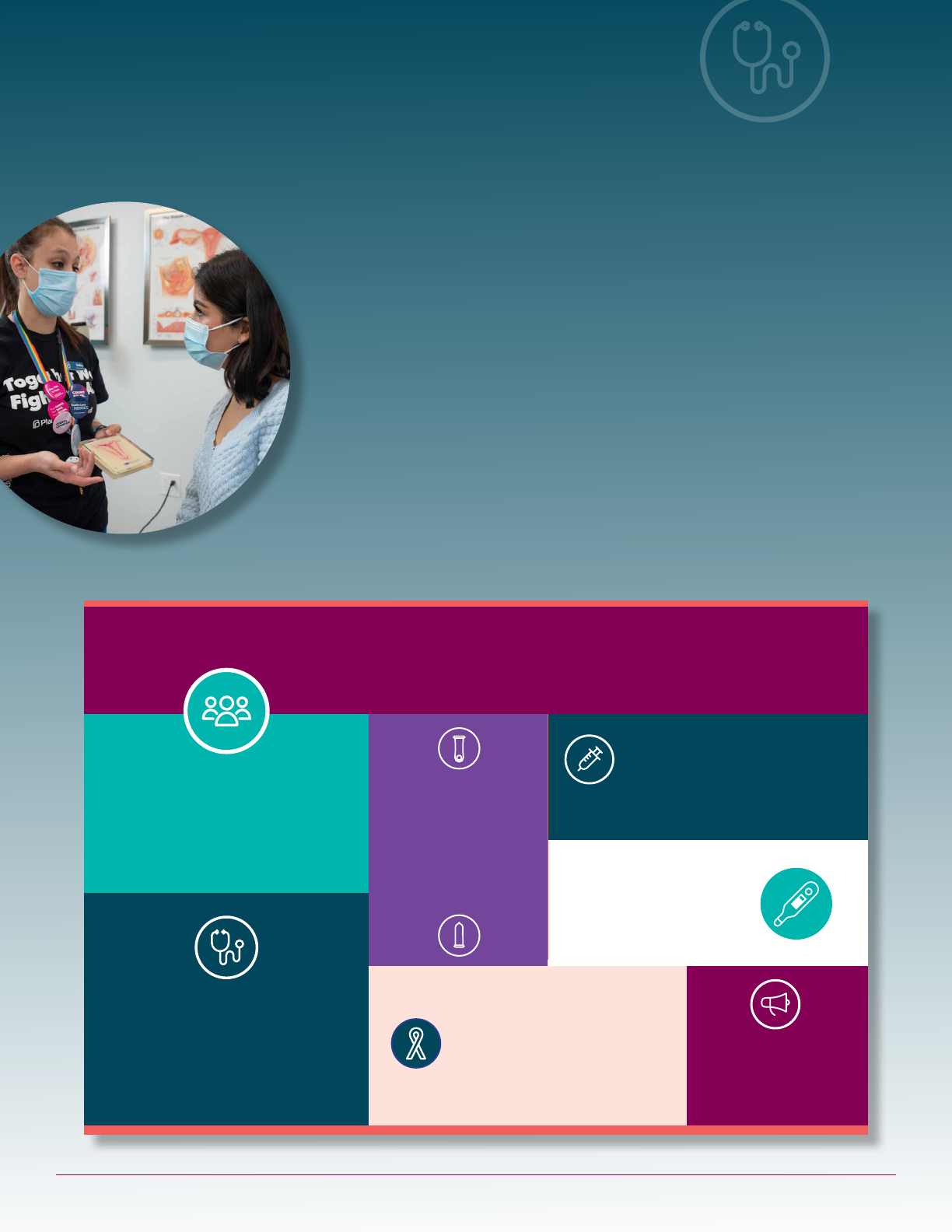
2 | 2020 IMPACT REPORT: HEALTH CARE IN 2020
2020 was a year of challenges and fear for the communities we serve. In response to the
COVID-19 pandemic, we adapted safety protocols in each health center and were there for patients who
needed expert sexual and reproductive health care delivered with compassion and respect.
We served 20% more people in 2020 than we did in 2019 — the most patients we
have served in a year since 2012, when the Texas legislature defunded Planned
Parenthoods statewide. Several factors contributed to this strong growth:
• New patients visited us because the pandemic caused some providers’
ofces to close or limit their hours. We kept the doors of all our health
centers open with neither interruption in service nor shortened hours;
• We lled some vacant clinician positions, increasing our capacity to
serve more patients;
• Our second health center that provides abortion care in San Antonio, which
opened in 2019 on a part-time basis, was staffed full-time with a dedicated
physician providing these services throughout 2020. As a result, we provided
more abortion care in last year, despite Governor Greg Abbott’s executive order
banning nearly all abortions during the early weeks of the pandemic.
Most importantly, your support for our work and our patients made it possible for
us to provide these services to thousands of patients who did not have insurance or the
resources to pay for all of their care. Thank you.
24,900
Patients served in
our health centers
26,274
Units of
contraception
provided
35,045 Tests for
sexually transmitted infections
3,329
Stop Cervical Cancer
tests and procedures
5,403
Pregnancy tests
3,166
Abortions
41,868
Total visits to
our health centers
$2,280,062
Financial assistance to patients
to help pay for their care
Health care in 2020
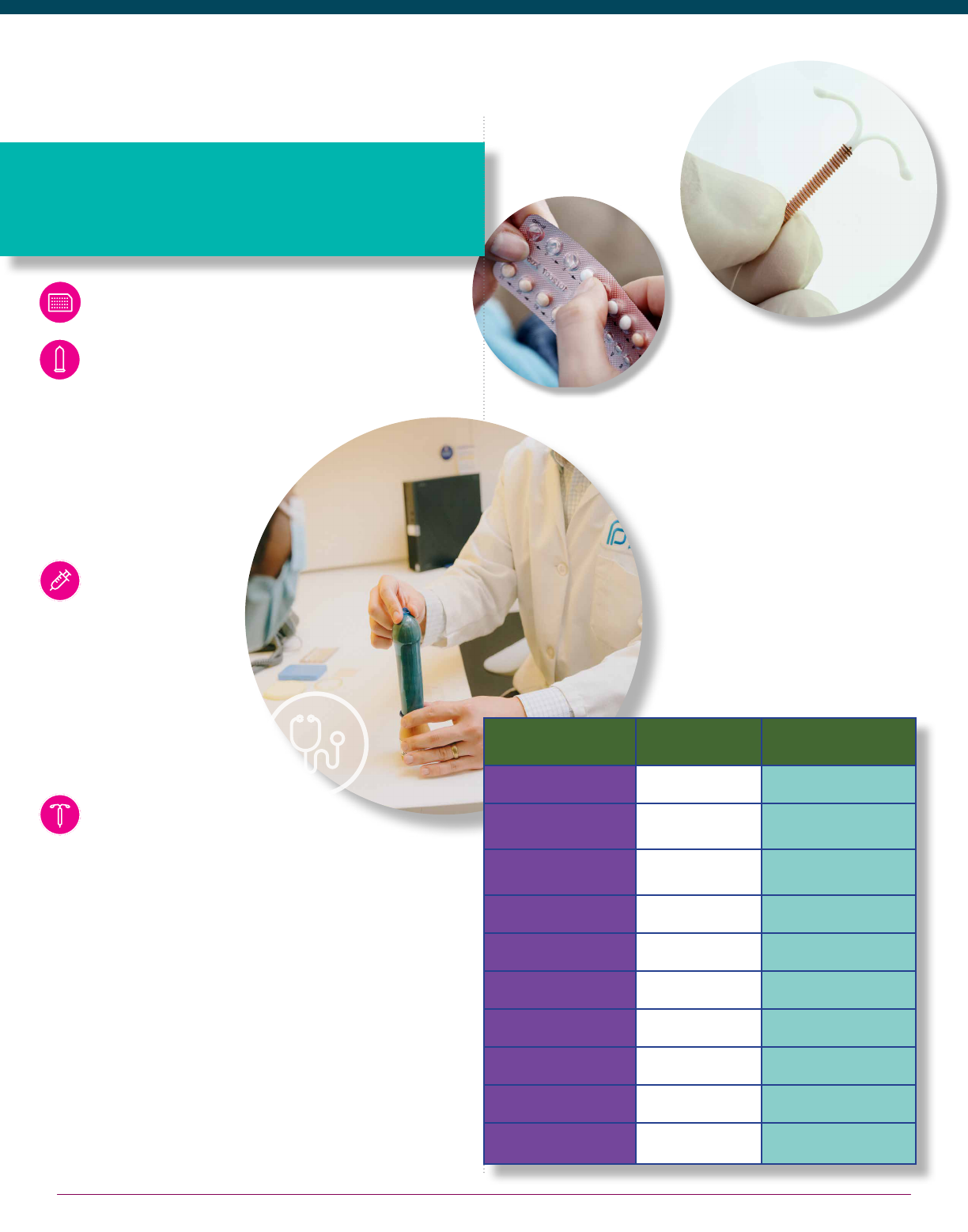
2020 IMPACT REPORT: BIRTH CONTROL | 3
Birth control
Contraception is our focus, as it has
been since Planned Parenthood South
Texas was founded in 1939.
needs. National policy and
health care funding need
to address these economic
disincentives to make LARCs within reach for
anyone who wants one.
Different forms of birth control
provide different amounts
of protection against
pregnancy. For example, a
pack of pills provides four
weeks of protection; the
contraceptive shot provides
three months of protection;
the copper IUD provides up
to 12 years of protection.
Oral contraceptives (the Pill) remain the most
popular form of birth control among our patients.
Demand for emergency contraception rose as
COVID-19 spread, likely because many patients
did not want to become pregnant
during the pandemic. In total,
we provided nearly 52%
more emergency
contraception in 2020
than we did
in 2019.
The birth control
shot experienced
9.6% growth in
2020 over 2019.
The shot, which
lasts three months,
is popular among
patients because it’s
safe, convenient, and
very effective.
Our provision of long-acting
reversible contraceptives (LARCs),
which include intrauterine devices and hormonal
implants, remained stable in 2020. Patients like
LARCs because they last for years and are more
than 99% effective. LARCs can cost up to $900,
making them prohibitively expensive for many
patients, but they are cost effective. A patient
using oral contraceptives will likely spend more
money for her birth control over many years than
a patient who uses a single LARC during that
time. LARCs would be even more popular among
patients if the upfront cost could be lowered.
This is why PPST, with support from donors and
foundation partners, allows patients to spread out
her co-pay over time, as much time as the patient
METHOD NUMBER
OF UNITS
TOTAL WEEKS
OF PROTECTION
Condoms
6,748 1,687
Emergency
contraception
2,112 2,112
Oral contraceptives
(packs)
11,826
47,304
Contraceptive patch
1 4
Vaginal ring
19 76
Hormonal shots
4,455 53,460
Hormonal implant
747 194,220
Copper IUD
222 138,528
Hormonal IUD
144 52,416
Total 26,274 489,807
Condom Female Condom Hormonal IUD Copper IUD
Implant The Pill (US) The Pill The Patch
Diaphragm Cervical Cap
Sponge
Vasectomy
Withdrawal Fertility Awareness
Method (FAM)
Abstinence
Sterilization
The Ring
The Shot Spermicide
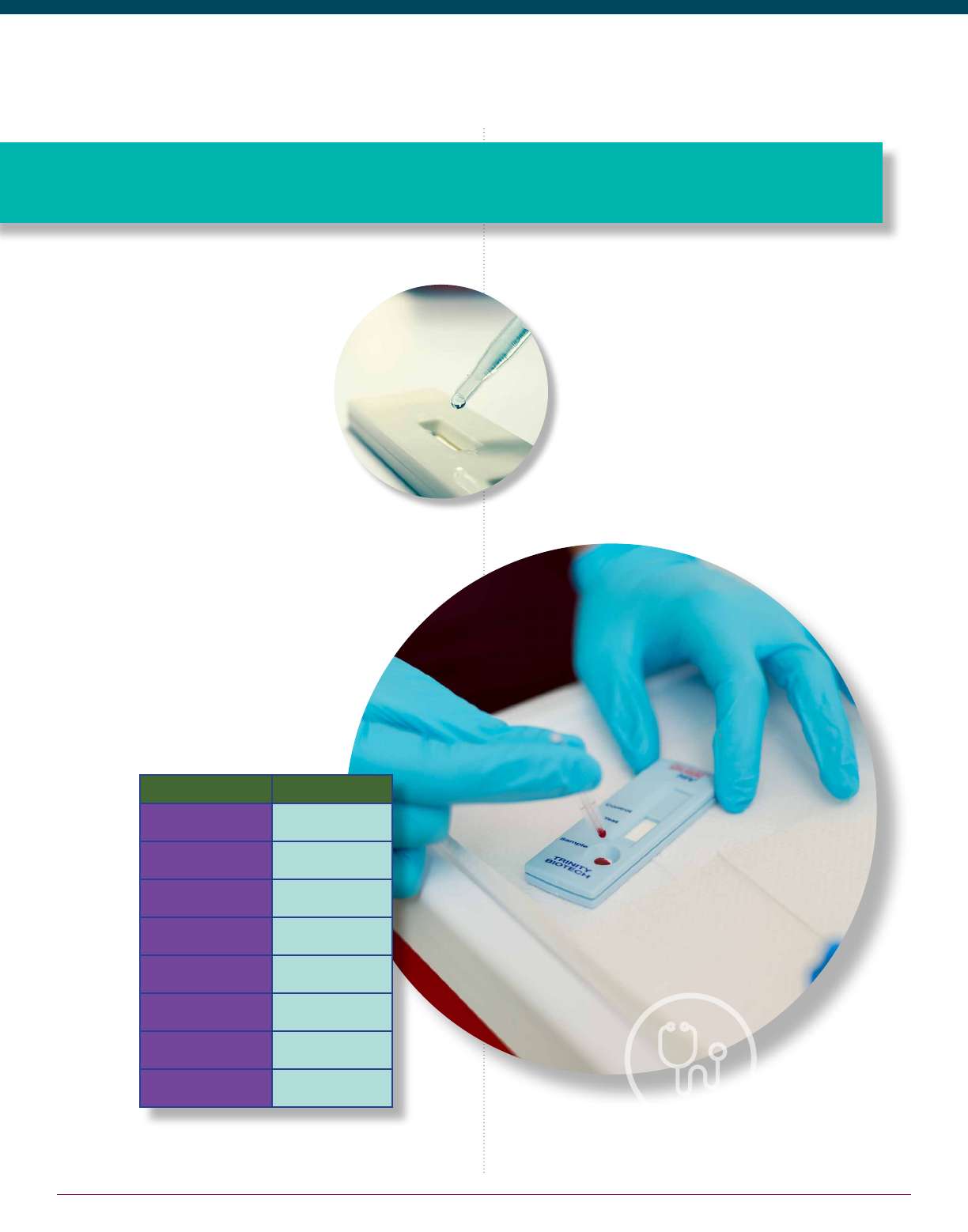
4 | 2020 IMPACT REPORT: SEXUALLY TRANSMITTED INFECTIONS
Sexually transmitted infections
prophylaxis (PrEP), daily medicine that can
reduce the chance of getting HIV from sex by
more than 90%.
Diagnosing and treating STIs are
crucial to stopping their spread. Left
untreated, STIs can put people at risk for
severe, lifelong health challenges such
as chronic pain and infertility, as well as
problems with sexual functioning. STIs
can also be passed on to a fetus in utero or
during birth, causing severe
health challenges.
We offer testing for gonorrhea,
chlamydia, HIV, syphilis, herpes,
HPV, and trichomoniasis at
all our health centers. We
can process most of these
tests in the health center
where the sample is taken;
for other tests, we send
the specimens to our high-
complexity lab at PPST’s
headquarters at 2140 Babcock
Road in San Antonio.
We offer treatment for most STIs; for HIV and
syphilis, we provide referrals to the local
health department. In addition to
testing and treatment, we provide
education to patients and the
community about STI prevention.
For patients at higher risk of HIV,
we may prescribe pre-exposure
Testing for sexually transmitted infections (STIs) is one of the most accessed
services in our health centers.
TESTS NUMBER
Chlamydia
8,253
Gonorrhea
8,253
Trichomoniasis
7,878
HIV
4,123
Syphilis
3,809
Herpes
1,782
HPV
947
Total STI tests
35,045
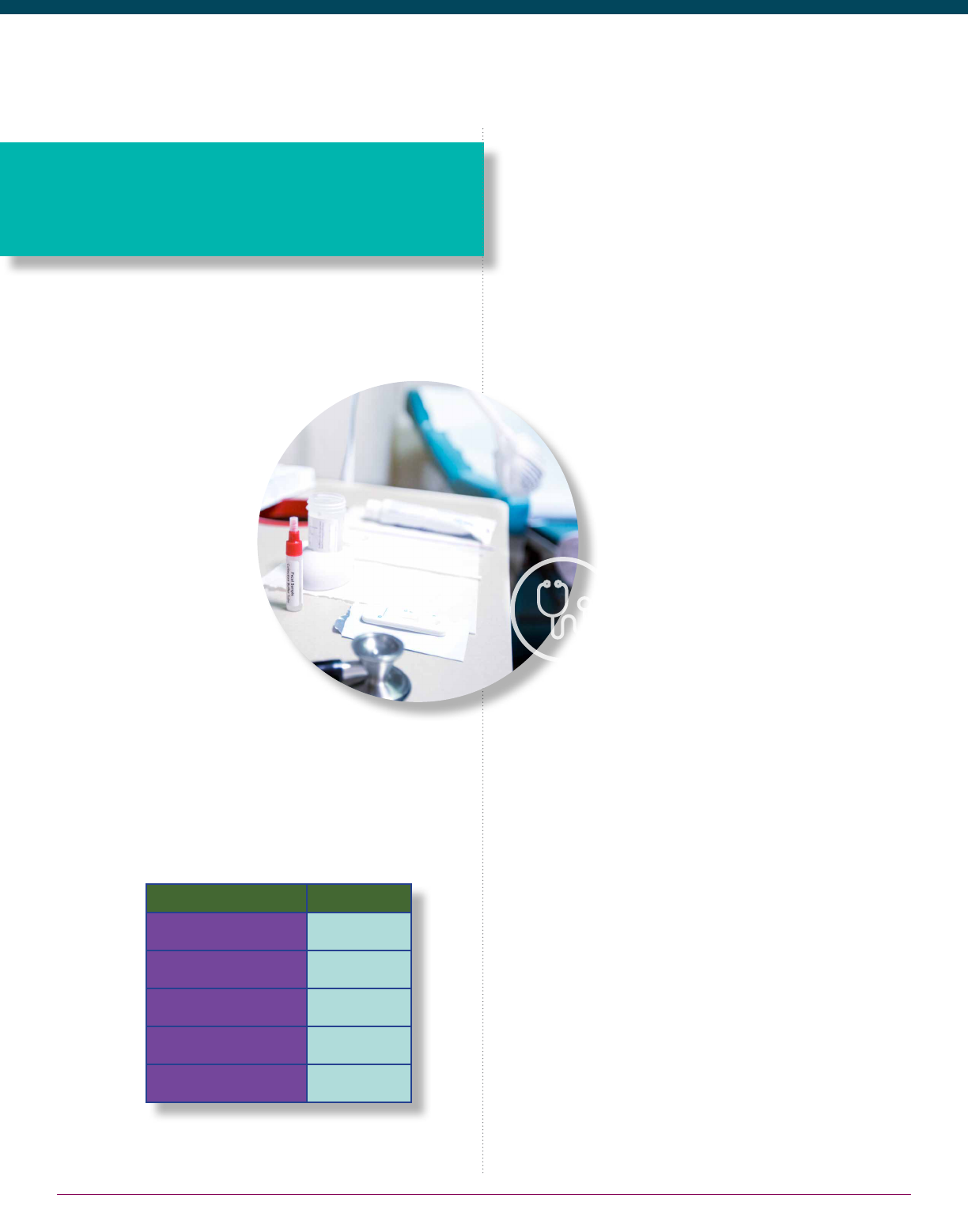
2020 IMPACT REPORT: STOP CERVICAL CANCER | 5
Stop Cervical Cancer
Stop Cervical Cancer is our effort
to reduce cases of and deaths from
cervical cancer.
It includes:
• Vaccines to prevent human papillomavirus
(HPV), an STI that is the root cause of virtually all
cases of cervical cancer;
• HPV tests;
• Pap tests to screen
the cervix for cells
that could lead to
cancer;
• Colposcopies
(examination of
the cervix using
a magnifying
instrument)
and biopsies to
diagnose cells that
could lead to cancer;
• Loop Electrosurgical Excision
Procedure (LEEP) to remove abnormal
cells before they can lead to cancer;
• For patients with cervical cancer, referrals
and patient navigation for immediate
oncological care.
SERVICE NUMBER
Pap tests
2,078
HPV tests
947
Coloscopies
121
HPV vaccinations
183
Total SCC services
3,329
Cervical cancer is a highly preventable disease
and, if caught early, highly treatable. Incidence
rates for cervical cancer dropped by more than
50% in the last 50 years due in part to an increase
in Pap testing, which can nd cervical changes
before they turn cancerous.
Unfortunately, disparities persist. The incidence
of cervical cancer among Latina women in the
United States is almost twice as high as the incidence
among non-Latina white women, according to
the National Latina Institute for Reproductive
Health, because Latinas experience
persistent systemic barriers to prevention,
screening, and treatment. We work
every day to ensure our communities
have access to affordable services for
cervical cancer.
National guidelines regarding
cervical cancer screenings have
changed in recent years. Annual
Paps are no longer recommended for
everyone. How often a patient should
receive a Pap depends on age, medical
history, and the results of the patient’s
previous cervical cancer screenings. Many
patients with normal test results are recommended
for re-testing only every three to ve years.
The Pap test plus an HPV (Human papillomavirus)
test (called co-testing) has been found to be more
effective in detecting cervical abnormalities than
Pap testing alone. Co-testing allows women to go
longer periods of time between screening.
HPV can cause certain types of cancer, including
cervical, vaginal, vulvar, penile, and anal cancers.
The HPV vaccine prevents infection from the
HPV types that cause more than 90% of these
cancers. The vaccine is routinely recommended
for adolescents at age 11 or 12 to ensure they are
protected before they are exposed to the virus.
It can be given to children as young as 9 and to
adults as late as age 45, but most people older
than 26 will not benet from HPV vaccination.
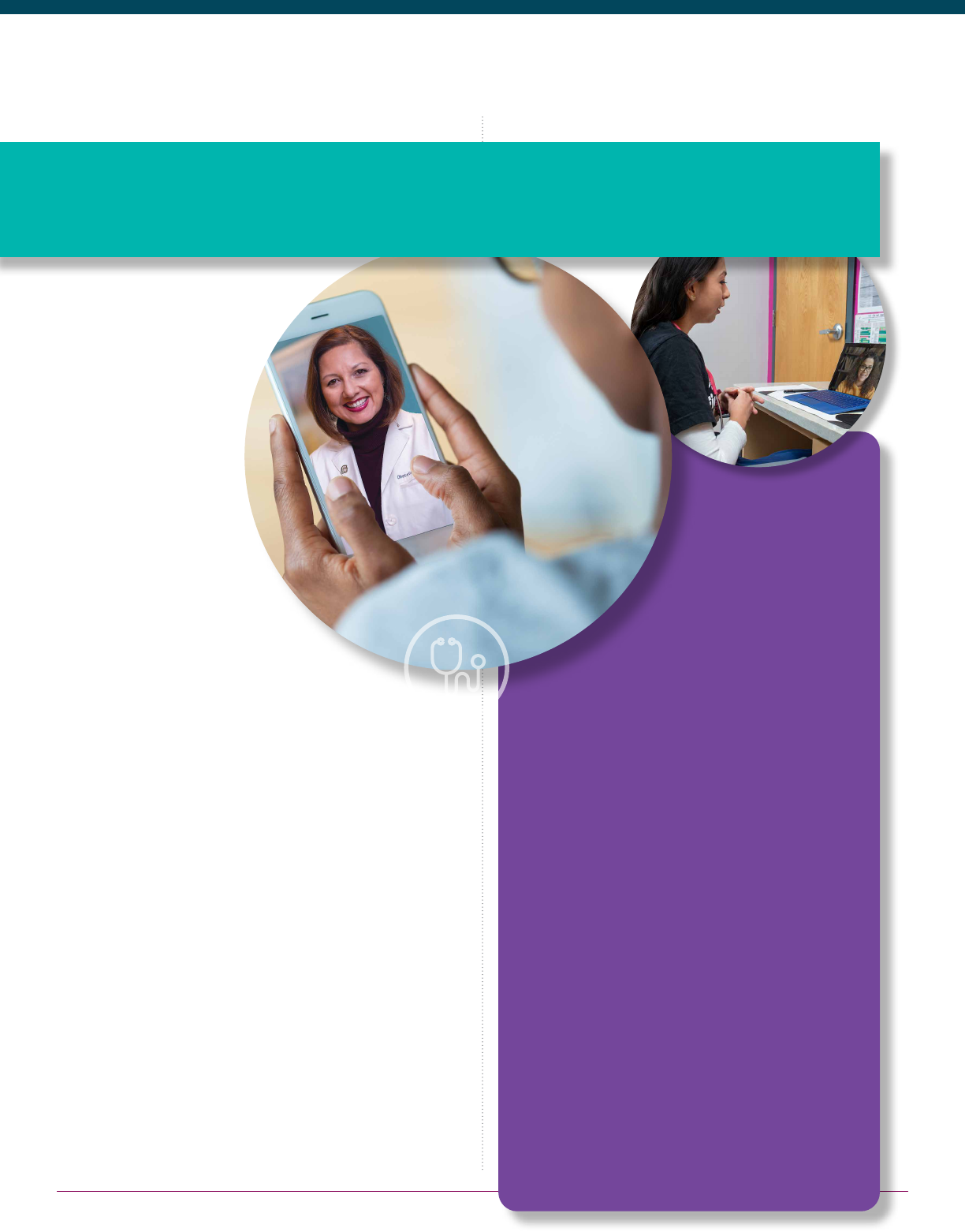
PP DIRECT
Beyond the 24,900
patients we served in
our health centers and
through virtual visits in
2020, another 1,066 South
Texans accessed care through
PP Direct, an app operated for the
benet of the Planned Parenthood
family nationwide.
The app allows patients to use a smartphone or
other device to request a prescription for birth
control pills, the ring, or the patch for home
delivery. Users also can request a prescription for
UTI treatment to pick up at the nearest pharmacy,
learn about different types of birth control, and
make a health center appointment.
To help people get care when it’s convenient
for them, the PP Direct app operates
asynchronously. The user can answer medical
screening questions on the app at any time, day
or night, then a Planned Parenthood clinician
reviews that information during clinic hours. The
user then gets a notication that information has
been reviewed by the clinician and care is now
authorized and ready.
PP Direct is reaching out to potential patients,
whereas standard telehealth typically is accessed
by existing patients. Half of users of PP Direct
report that they have never been to a Planned
Parenthood clinic before, anywhere. People living
in both rural and urban areas throughout South
Texas accessed this service in 2020.
6 | 2020 IMPACT REPORT: TELEHEALTH
Telehealth
We launched the
service in August
2020 using a virtual
care platform,
available via the
free Planned
Parenthood
South Texas app.
Telehealth allows
patients to reach
us from wherever
they might be.
Beyond the
pandemic, telehealth
will help us serve
patients who have
challenges such as childcare
or transportation issues that make
it difcult for them to visit us in clinic. It can help
expand our reach into rural pockets of South Texas
that are medically underserved.
In 2020, we provided 274 virtual visits
through telehealth.
The most commonly accessed service was birth
control. Patients also used telehealth for STIs,
vaginitis, urinary tract infections, gender-afrming
hormone therapy, pelvic pain, bleeding, and more.
More than half of patients who completed virtual
visits with us in 2020 live in Bexar County. Others
hailed from the Rio Grande Valley, the counties
contiguous to Bexar, and throughout
South Texas.
In response to the COVID-19 pandemic, Planned Parenthood South Texas
accelerated our launch of telehealth services — virtual visits during which patients
can connect to a health care provider, live, using state-of-the-art technology.

2020 IMPACT REPORT: WHO WE SERVED | 7
Who We Served in 2020
MALE
12%
FEMALE
88%
25-29
23%
30-44
26%
18-24
44%
45 or
OLDER
4%
17 or
YOUNGER
3%
Did not
report
4%
Other
5%
Anglo/
Non-Hispanic
White
12%
Black
8%
Asian
2%
Hispanic/
Latino
68%
GENDER
AS REPORTED
AGE
RACE/
ETHNICITY
AS REPORTED
Gender and race/ethnicity
are self-reported by patients
based on how they identify.
Native
1%

Education
Our Habla Con Tu Hermana outreach program
educates underserved Latinas in Cameron County
about sexual and reproductive health. Promotoras
(state-certied community health workers) deliver
presentations on topics such as include family
planning, breast health, cervical cancer prevention,
HIV and other sexually transmitted infections,
and talking to your kids about sexual health and
responsibility.
Promotoras also serve as patient navigators
to connect people to care. People without the
resources or insurance to pay for health care receive
vouchers to cover the cost of services during a visit
to our health centers in Brownsville or Harlingen.
In 2020, promotoras launched a Facebook page
and began online education and outreach. They
also began helping the community in other ways,
including distributing food at local food drives
organized by other nonprot organizations.
2020 ACTIVITIES:
222 events
(in person and virtual)
5,375
people reached
254 vouchers
redeemed for
health care
8 | 2020 IMPACT REPORT: IN THE COMMUNITY
In the community
¿Necesitas un examen?
¡Lleve esta tarjeta a Planned Parenthood en Harlingen o
Brownsville y recibe servicios de salud preventivos sin costo
alguno para usted!
Los servicios que califican incluyen: exámenes ginecológicos,
pruebas de embarazo, control de la natalidad (métodos
aprobados), pruebas y tratamiento de las ETS
Harlingen Brownsville
712 N.77 Sunshine Strip 870 E. Alton Gloor Blvd.
(956) 423-8584 (956) 546-4571
Si puede, por favor traiga lo siguiente a su visita:
identicación con fotografía • comprobante de ingresos (talón de
cheque) • el número de seguro social • y la tarjeta de seguranza
(privado o de Medicaid)
Los servicios que califican so determinados por el gerente del centro de salud.
Una sola vez se puede utilizar. La tarjeta no puede ser sustituida
en caso de pérdida o robo.
www.ppsouthtexas.org
Fecha de vencimiento: Número de tarjeta:
Navegador: Teléfono:
Volunteers
PPST volunteers support our mission in many
ways. They serve as safety aides for our patients,
raise awareness of our work in the community,
help at the reception desk and with administrative
work, and serve as advocates for sexual and
reproductive health care and rights.
During the early months of the pandemic,
volunteers sewed face masks and supported our
online education outreach. They also virtually
testied before the State Board of Education to
advocate for comprehensive sex education. We also
started a Clinic Care program wherein volunteers
take snacks and goodies to clinic staff to show
appreciation for the work they do every day.
In 2020, a total of 76 people volunteered
at Planned Parenthood; together, they
volunteered a total of 1,772 hours.
Outside our health centers, our
work includes smart community
health education, strong advocacy,
and dedicated volunteers. While
the pandemic limited our in-person
activities, we found new ways to
engage the communities we serve.
Advocacy
At Planned Parenthood South Texas, we believe that:
– Birth control is a foundational aspect of planning
a person’s future and creating a better life for
every person and their family;
– Everyone has the right to decide whether, when,
and how many children to have;
– Everyone has the right to access high-quality
prenatal care, adoption services, and abortion care;
– Sexuality is a wonderful part of being human,
and sexual health care is essential to ensure a
happy, fullling, and responsible love life;
– Sexual health care must be provided with
compassion and respect — no shame, no judgment.
We partner with a number of community
organizations to advocate for gender equality, racial
equity, LGBTQ+ equality, public health, immigrant
rights, voting rights, climate issues, economic justice,
and violence prevention. Together we ght for all.
In 2020, much of our advocacy work moved online.
We organized 11 virtual events, and our overall
social media following grew by 12%. We also
collected 689 supporter cards early in the year and
delivered more than 800 door hangers promoting
participation in the 2020 Census.
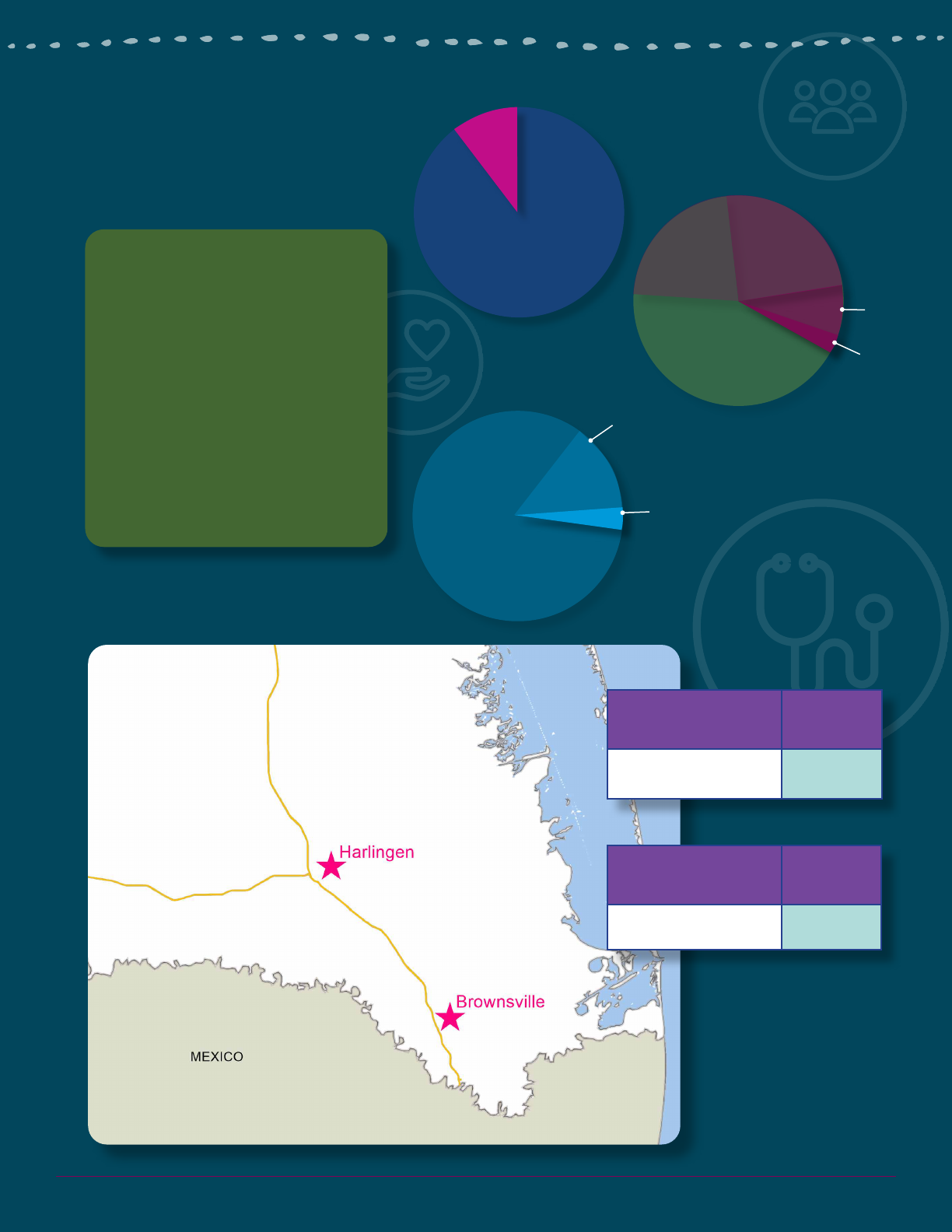
2020 IMPACT REPORT: RIO GRANDE VALLEY HEALTH CENTERS | 9
Brownsville
health center
Patients
served
in 2020
870 E. Alton Gloor Blvd.,
Suite B
1,891
Harlingen
health center
Patients
served
in 2020
712 N. 77 Sunshine Strip,
Suite 18
2,561
Patient declined
to answer
14%
Hispanic/
Latino
84%
RACE/
ETHNICITY
AS REPORTED
Other
2%
MALE
12%
FEMALE
88%
GENDER
AS REPORTED
25-29
23%
30-44
24%
18-24
44%
45 or
OLDER
7%
17 or
YOUNGER
2%
AGE
4,452
Patients served
6,184
Units of contraception
provided
6
,451
Tests for sexually
transmitted infections
1,322
Pregnancy tests
1,119
Stop Cervical Cancer
tests and procedures
Rio Grande Valley
Health Centers
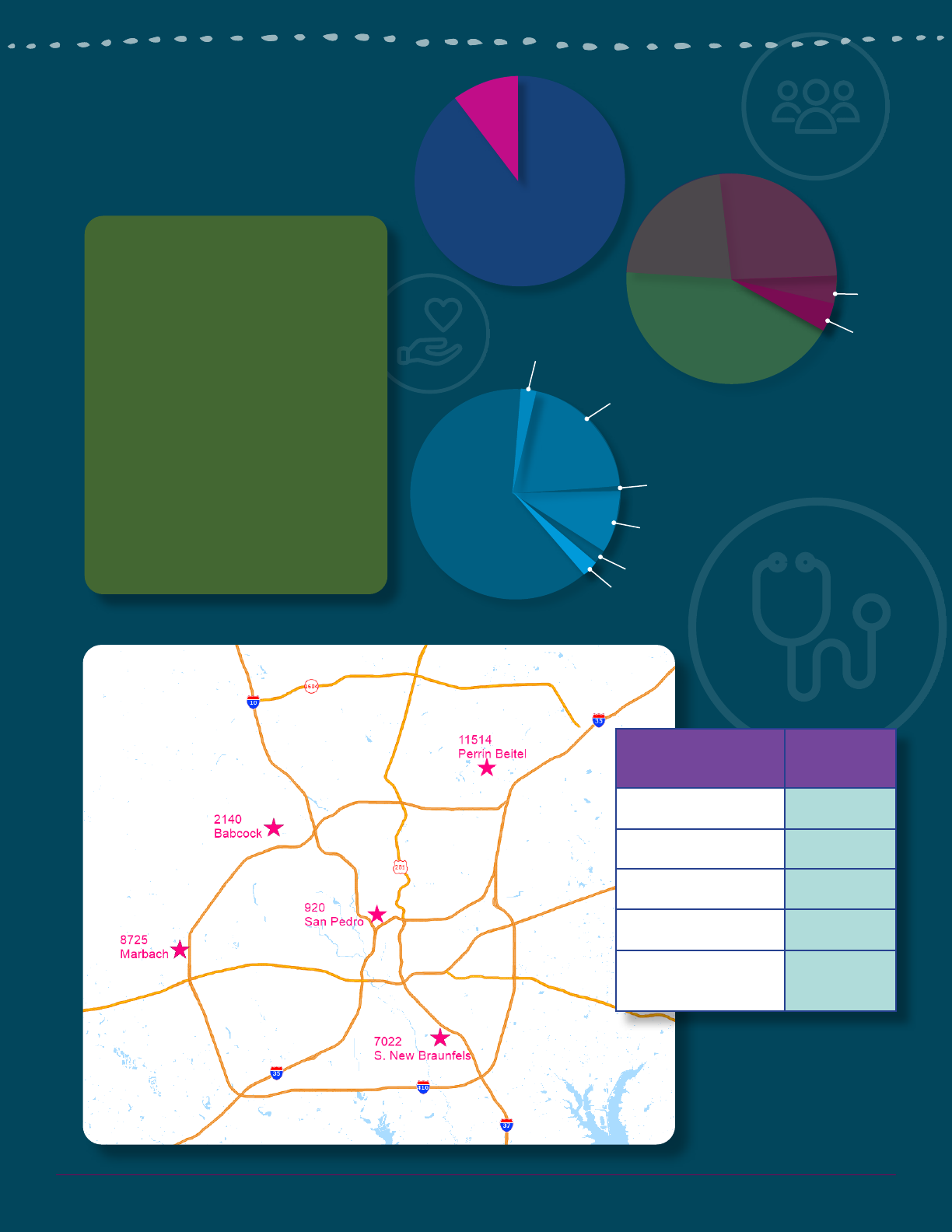
Other
6%
Patient
declined to
answer
2%
Anglo/
Non-Hispanic
White
15%
Black
10%
Asian
2%
Hispanic/
Latino
64%
RACE/
ETHNICITY
AS REPORTED
Native
American
1%
10 | 2020 IMPACT REPORT: SAN ANTONIO HEALTH CENTERS
San Antonio
health centers
Patients
served
in 2020
2140 Babcock Road
5,109
8725 Marbach Road
3,147
11514 Perrin Beitel Road
3,386
920 San Pedro Ave.
5,699
7022 S. New Braunfels Ave.
( New location as of
December 2020)
3,107
MALE
12%
FEMALE
88%
GENDER
AS REPORTED
25-29
23%
30-44
26%
18-24
43%
45 or
OLDER
4%
17 or
YOUNGER
4%
AGE
20,448
Patients served
19,083
Units of contraception
provided
28,594
Tests for sexually
transmitted infections
4,081
Pregnancy tests
2,210
Stop Cervical Cancer
tests and procedures
3,165
Abortions
San Antonio
Health Centers
